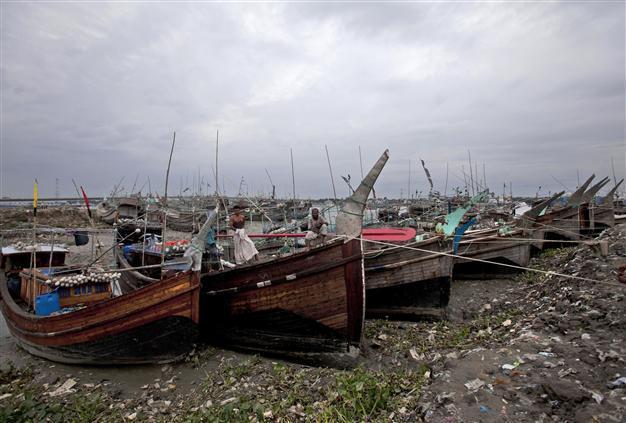Cyclone triggers mass evacuations in Bangladesh, Myanmar
Sittwe, Myanmar – Agence France-Presse

Bangladeshi fishermen sit on their boat on the banks of the river Kornofuli, in Chittagong, Bangladesh, Wednesday, May 15, 2013. AP Photo
Hundreds of thousands of people in Bangladesh and Myanmar were ordered to evacuate Wednesday as a cyclone bore down on coastal areas home to flood-prone refugee camps for victims of sectarian unrest.The United Nations has warned that more than eight million people could be at risk from Cyclone Mahasen, which is expected to make landfall on Thursday or Friday somewhere near the border between the two countries.
Bangladesh told hundreds of thousands of people living in low-lying areas to move to cyclone shelters, while Myanmar announced plans to relocate roughly 166,000 people on its northwest coast to safety.
But in Myanmar's state of Rakhine, many Muslim Rohingya made homeless by communal bloodshed last year said they were too scared to move, reflecting their deep mistrust of the authorities and of local Buddhists.
"We could die here. We have no place to go," said Yu Sut Taw, a Muslim man living in a camp on the outskirts of the state capital Sittwe, one of several in Rakhine which are home to a total of about 140,000 displaced persons.
AFP reporters who visited two camps on Wednesday saw few signs of a mass evacuation under way.
Buddhist-Muslim clashes in the region last year left about 200 people dead and whole neighbourhoods burned to the ground.
Illustrating the dangers facing some of those who have tried to flee, 58 Rohingya were missing after their boat capsized on Monday as they tried to escape to higher ground.
The cyclone appeared to have lost some of its strength as it churned northwards through the Bay of Bengal, the UN Office for the Coordination of Humanitarian Affairs said in a statement late Tuesday.
But it may still bring "life-threatening conditions" for 8.2 million people in northeast India, Bangladesh and Myanmar, it warned.
Around 30 million of Bangladesh's 153 million people live along the coast, which is also home to ramshackle camps housing Rohingya refugees.
"We have been using loudspeakers to alert both documented and undocumented Rohingya refugees of the dangers of the cyclone," said Mohammed Kamruzzaman, a government magistrate in charge of a Rohingya camp in Cox's Bazaar.
"We've also stockpiled dry food, kept medical teams and ambulances on standby and shifted the sick and pregnant women from the camps to hospitals." Cyclone Mahasen was packing winds of up to 88 kilometres (55 miles) per hour at its centre and could unleash a storm surge of up to seven feet (two metres), said Shamsuddin Ahmed, deputy chief of Bangladesh Meteorological Department.
Bangladesh and Myanmar have both been frequent victims of cyclones which have left hundreds of thousands of people dead in recent decades.
Cyclone Nargis, which devastated Myanmar's Irrawaddy Delta in May 2008, killed about 140,000 people.
Experts say Bangladesh is better prepared to handle cyclones than authorities across the border in Rakhine, where the military was deployed to oversee the evacuation.
"Some people don't want to leave. We don't want to see them die so we will move them under the law of protection from natural disasters," said Aung Min, minister of the Myanmar president's office.
"We will continue to evacuate as many as possible until the last minute when the cyclone hits." He said about 27,000 Rohingya had already been moved but added that there was a lack of proper cyclone shelters.
"We don't have any cyclone shelter in Rakhine state. We see that we should have constructed cyclone shelters there." Myanmar said the cyclone could delay President Thein Sein's planned state visit to Washington -- the first in almost half a century by a leader of the country formerly known as Burma, which is emerging from decades of military rule.
Rights groups have criticised Myanmar for failing to provide permanent housing sooner for displaced Rohingya, after months of warnings of the danger posed to the camps by this year's monsoon.
















